新概念英语第三册课文翻译及学习笔记:Lesson14
- 格式:docx
- 大小:40.01 KB
- 文档页数:7
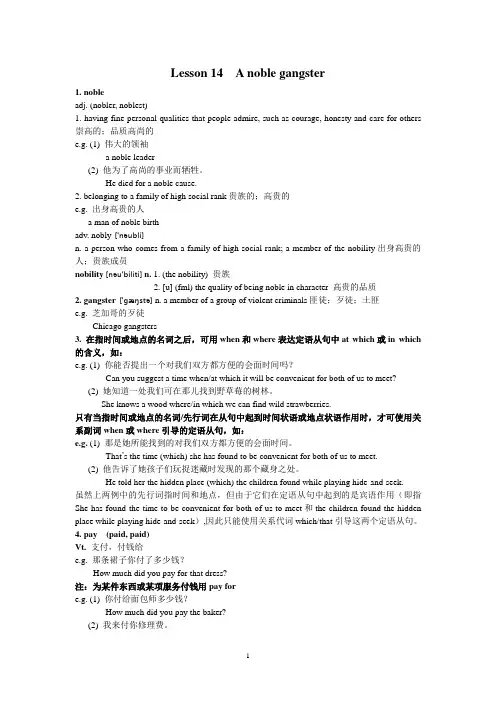
Lesson 14 A noble gangster1. nobleadj. (nobler, noblest)1. having fine personal qualities that people admire, such as courage, honesty and care for others 崇高的;品质高尚的e.g. (1) 伟大的领袖a noble leader(2) 他为了高尚的事业而牺牲。
He died for a noble cause.2. belonging to a family of high social rank贵族的;高贵的e.g. 出身高贵的人a man of noble birthadv. nobly['nəubli]n. a person who comes from a family of high social rank; a member of the nobility出身高贵的人;贵族成员nobility [nəu'biliti] n. 1. (the nobility) 贵族2. [u] (fml) the quality of being noble in character 高贵的品质2. gangster['gæŋstə] n. a member of a group of violent criminals匪徒;歹徒;土匪e.g. 芝加哥的歹徒Chicago gangsters3. 在指时间或地点的名词之后,可用when和where表达定语从句中at which或in which 的含义,如:e.g. (1) 你能否提出一个对我们双方都方便的会面时间吗?Can you suggest a time when/at which it will be convenient for both of us to meet?(2) 她知道一处我们可在那儿找到野草莓的树林。
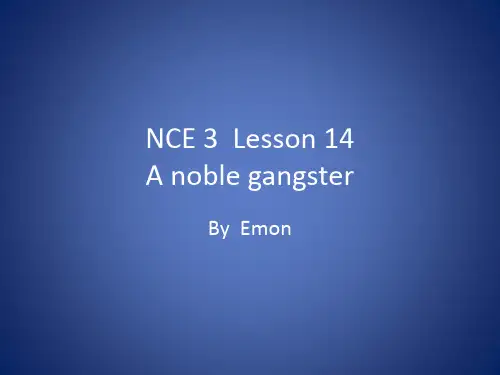
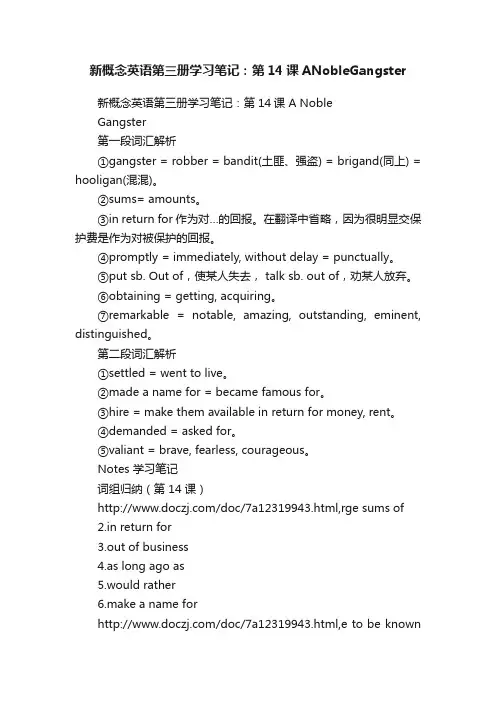
新概念英语第三册学习笔记:第14课ANobleGangster新概念英语第三册学习笔记:第14课 A NobleGangster第一段词汇解析①gangster = robber = bandit(土匪、强盗) = brigand(同上) = hooligan(混混)。
②sums= amounts。
③in return for 作为对…的回报。
在翻译中省略,因为很明显交保护费是作为对被保护的回报。
④promptly = immediately, without delay = punctually。
⑤put sb. Out of,使某人失去, talk sb. out of,劝某人放弃。
⑥obtaining = getting, acquiring。
⑦remarkable = notable, amazing, outstanding, eminent, distinguished。
第二段词汇解析①settled = went to live。
②made a name for = became famous for。
③hire = make them available in return for money, rent。
④demanded = asked for。
⑤valiant = brave, fearless, courageous。
Notes 学习笔记词组归纳(第 14 课)/doc/7a12319943.html,rge sums of2.in return for3.out of business4.as long ago as5.would rather6.make a name for/doc/7a12319943.html,e to be knownto sb.8.be at war with sb.9.be willing to10.in times of11.burn down12.in spite of13.at the age of14.the memory of。
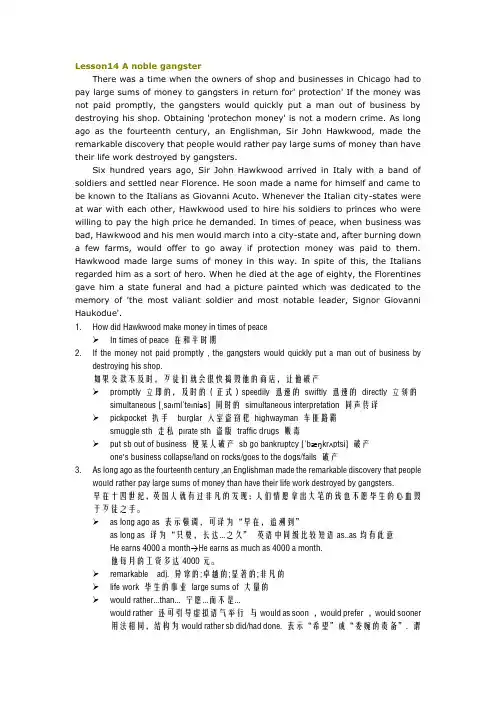
Lesson14 A noble gangsterThere was a time when the owners of shop and businesses in Chicago had to pay large sums of money to gangsters in return for' protection' If the money was not paid promptly, the gangsters would quickly put a man out of business by destroying his shop. Obtaining 'protechon money' is not a modern crime. As long ago as the fourteenth century, an Englishman, Sir John Hawkwood, made the remarkable discovery that people would rather pay large sums of money than have their life work destroyed by gangsters.Six hundred years ago, Sir John Hawkwood arrived in Italy with a band of soldiers and settled near Florence. He soon made a name for himself and came to be known to the Italians as Giovanni Acuto. Whenever the Italian city-states were at war with each other, Hawkwood used to hire his soldiers to princes who were willing to pay the high price he demanded. In times of peace, when business was bad, Hawkwood and his men would march into a city-state and, after burning down a few farms, would offer to go away if protection money was paid to them. Hawkwood made large sums of money in this way. In spite of this, the Italians regarded him as a sort of hero. When he died at the age of eighty, the Florentines gave him a state funeral and had a picture painted which was dedicated to the memory of 'the most valiant soldier and most notable leader, Signor Giovanni Haukodue'.1.How did Hawkwood make money in times of peace➢In times of peace 在和平时期2.If the money not paid promptly , the gangsters would quickly put a man out of business bydestroying his shop.如果交款不及时,歹徒们就会很快捣毁他的商店,让他破产➢promptly 立即的,及时的(正式)speedily 迅速的swiftly 迅速的directly 立刻的simultaneous [ˌsaɪmlˈteɪniəs] 同时的simultaneous interpretation 同声传译➢pickpocket 扒手burglar 入室盗窃犯highwayman 车匪路霸smuggle sth 走私pirate sth 盗版traffic drugs 贩毒➢put sb out of business 使某人破产sb go bankruptcy [ˈbæŋkrʌptsi] 破产one’s business collapse/land on rocks/goes to the dogs/fails 破产3.As long ago as the fourteenth century ,an Englishman made the remarkable discovery that peoplewould rather pay large sums of money than have their life work destroyed by gangsters.早在十四世纪,英国人就有过非凡的发现:人们情愿拿出大笔的钱也不愿毕生的心血毁于歹徒之手。
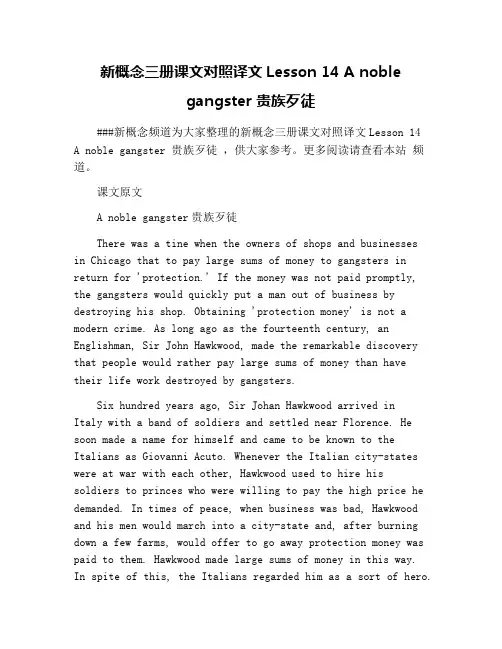
新概念三册课文对照译文Lesson 14 A noblegangster 贵族歹徒###新概念频道为大家整理的新概念三册课文对照译文Lesson 14A noble gangster 贵族歹徒,供大家参考。
更多阅读请查看本站频道。
课文原文A noble gangster贵族歹徒There was a tine when the owners of shops and businessesin Chicago that to pay large sums of money to gangsters in return for 'protection.' If the money was not paid promptly, the gangsters would quickly put a man out of business by destroying his shop. Obtaining 'protection money' is not a modern crime. As long ago as the fourteenth century, an Englishman, Sir John Hawkwood, made the remarkable discovery that people would rather pay large sums of money than havetheir life work destroyed by gangsters.Six hundred years ago, Sir Johan Hawkwood arrived inItaly with a band of soldiers and settled near Florence. He soon made a name for himself and came to be known to the Italians as Giovanni Acuto. Whenever the Italian city-states were at war with each other, Hawkwood used to hire hissoldiers to princes who were willing to pay the high price he demanded. In times of peace, when business was bad, Hawkwood and his men would march into a city-state and, after burning down a few farms, would offer to go away protection money was paid to them. Hawkwood made large sums of money in this way.In spite of this, the Italians regarded him as a sort of hero.When he died at the age of eighty, the Florentines gave him a state funeral and had a pictured with as dedicated to the memory of 'the most valiant soldier and most notable leader, Signor Giovanni Haukodue.'以前有一个时期,芝加哥的店主和商行的老板们不得不拿出大笔的钱给歹徒以换取"保护"。
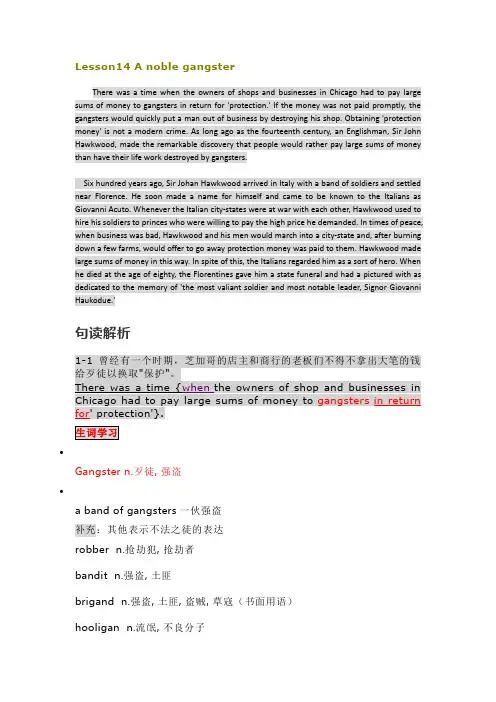
Lesson14 A noble gangsterThere was a time when the owners of shops and businesses in Chicago had to pay large sums of money to gangsters in return for 'protection.' If the money was not paid promptly, the gangsters would quickly put a man out of business by destroying his shop. Obtaining 'protection money' is not a modern crime. As long ago as the fourteenth century, an Englishman, Sir John Hawkwood, made the remarkable discovery that people would rather pay large sums of money than have their life work destroyed by gangsters.Six hundred years ago, Sir Johan Hawkwood arrived in Italy with a band of soldiers and settled near Florence. He soon made a name for himself and came to be known to the Italians as Giovanni Acuto. Whenever the Italian city-states were at war with each other, Hawkwood used to hire his soldiers to princes who were willing to pay the high price he demanded. In times of peace, when business was bad, Hawkwood and his men would march into a city-state and, after burning down a few farms, would offer to go away protection money was paid to them. Hawkwood made large sums of money in this way. In spite of this, the Italians regarded him as a sort of hero. When he died at the age of eighty, the Florentines gave him a state funeral and had a pictured with as dedicated to the memory of 'the most valiant soldier and most notable leader, Signor Giovanni Haukodue.'句读解析1-1曾经有一个时期,芝加哥的店主和商行的老板们不得不拿出大笔的钱给歹徒以换取"保护"。
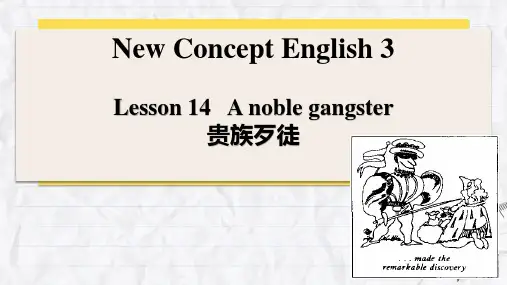
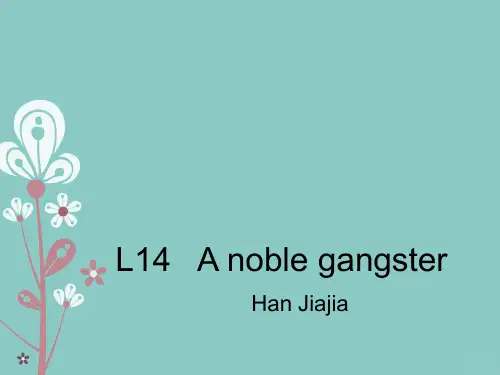
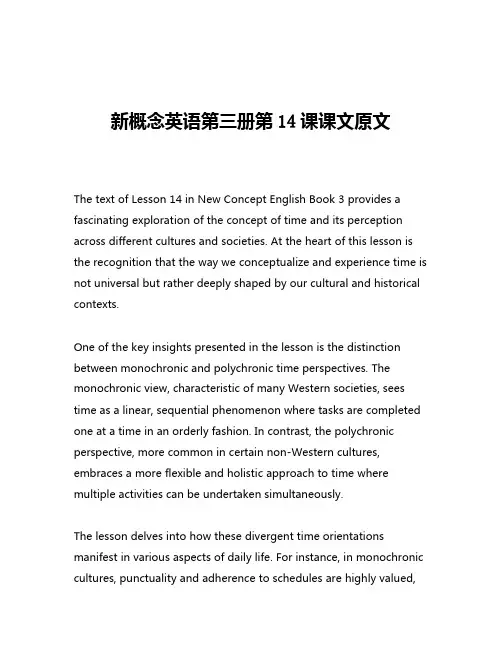
新概念英语第三册第14课课文原文The text of Lesson 14 in New Concept English Book 3 provides a fascinating exploration of the concept of time and its perception across different cultures and societies. At the heart of this lesson is the recognition that the way we conceptualize and experience time is not universal but rather deeply shaped by our cultural and historical contexts.One of the key insights presented in the lesson is the distinction between monochronic and polychronic time perspectives. The monochronic view, characteristic of many Western societies, sees time as a linear, sequential phenomenon where tasks are completed one at a time in an orderly fashion. In contrast, the polychronic perspective, more common in certain non-Western cultures, embraces a more flexible and holistic approach to time where multiple activities can be undertaken simultaneously.The lesson delves into how these divergent time orientations manifest in various aspects of daily life. For instance, in monochronic cultures, punctuality and adherence to schedules are highly valued,with individuals often strictly managing their time and prioritizing one task at a time. Polychronic societies, on the other hand, tend to be more relaxed about time, with people often engaging in multiple tasks concurrently and placing greater emphasis on interpersonal relationships and the contextual flow of events.Furthermore, the text explores how these time perspectives can shape communication styles and patterns of interaction. In monochronic cultures, conversations and negotiations often follow a linear, task-oriented trajectory, with participants seeking to achieve specific goals within a predetermined timeframe. Polychronic societies, in contrast, may place greater importance on building rapport, sharing stories, and allowing discussions to unfold organically, even if this means deviating from a strict agenda.The lesson also delves into the implications of these time orientations for various aspects of life, such as business practices, decision-making processes, and even the design of physical spaces. For instance, the layout and organization of workspaces in monochronic cultures may prioritize individual focus and efficiency, while polychronic environments may foster more communal and collaborative arrangements.One of the most thought-provoking aspects of the lesson is the recognition that neither the monochronic nor the polychronicperspective is inherently superior or more "correct." Instead, the text emphasizes the importance of understanding and respecting the diversity of time perceptions across cultures, and the need to adapt our approaches and expectations accordingly.This lesson on time perspectives also serves as a powerful reminder of the profound influence that culture can have on our fundamental ways of thinking and experiencing the world. By exploring these differences, we are challenged to question our own assumptions and biases, and to develop a more nuanced and empathetic understanding of the diverse ways in which human beings navigate and make sense of the passage of time.In conclusion, the text of Lesson 14 in New Concept English Book 3 offers a compelling and insightful exploration of the cultural relativity of time. By delving into the contrasting monochronic and polychronic time perspectives, the lesson encourages readers to broaden their horizons, embrace cultural diversity, and cultivate a more flexible and adaptive approach to the way we organize and experience time in our daily lives.。

新概念英语第三册:Lesson14重点句型解析1、How did Haywood make in times of peace?There was a tine when the owners of shops and businesses in Chicago that topay large sums of money to gangsters in return for'protection.'pay large sums of money to sb 向某人付大笔大笔的费用in return for… 目的是为了换取…, 作为对…的回报-- He gave me some books in return for my help.when 引导状语从句修饰 time-- There was a time when mini skirt was in fashion.(Mini n.迷你型, 袖珍型)2、If the money was not paid promptly, the gangsters would quickly put a manout of business by destroying his shop.Promptly = immediatelyput a man out of business 使某人失业put sb/sth out of... 使某人失去…-- You are putting me out of patience. 你使我失去耐心了。
-- You have already put everything out of order.-- Put it out of your mind. 忘记这件事情吧。
by destroying his shop 通过…手段-- You are putting me out of patience by disturbing me.3、Obtaining 'protection money' is not a modern crime.Obtaining = getting4、As long ago as the fourteenth century, an Englishman, Sir John Hawkwood,made the remarkable discovery that people would rather pay large sums of moneythan have their life work destroyed by gangsters.as long ago as 追溯回到(= dating back to = date from)-- I knew Jane as long ago as the year 1980.make the remarkable discovery 做出不同寻常的发现would rather do... than do... 宁愿…而不…-- He would rather die than surrender.(vi.投降, 自首)-- I would rather play tennis than swim.would prefer to do ... than do...would prefer doing ... to doing...-- He would prefer to die than surrender.-- He would prefer dying to surrendering.would rather(sooner) + that 宾语从句(过去式)-- 虚拟语气-- I would rather that you were not here. 我宁愿你不在这。

Lesson 48 The silent village 沉默的村庄一、【Text】课文In this much-travelled world, there are still thousands of places which are inaccessible to tourists. We always assume that villagers in remote places are friendly and hospitable. But people who are cut off not only from foreign tourists, but even from their own countrymen can be hostile to travellers. Visits to really remote villages are seldom enjoyable -- as my wife and I discovered during a tour through the Balkans.We had spent several days in a small town and visited a number of old churches in the vicinity. These attracted many visitors, for they were not only of great architectural interest, but contained a large number of beautifully preserved frescoes as well. On the day before our departure, several bus loads of tourists descended on the town. This was more than we could bear, so we decided to spend our last day exploring the countryside. Taking a path which led out of the town, we crossed a few fields until we came to a dense wood. We expected the path to end abruptly, but we found that it traced its way through the trees. We tramped through the wood for over two hours until we arrived at a deep stream. We could see that the path continued on the other side, but we had no idea how we could get across the stream. Suddenly my wife spotted a boat moored to the bank. In it there was a boatman fast asleep. We gently woke him up and asked him to ferry us to the other side. Though he was reluctant to do so at first, we eventually persuaded him to take us.The path led to a tiny village perched on the steep sides of a mountain. The place consisted of a straggling unmade road which was lined on either side by small houses. Even under a clear blue sky, the village looked forbidding, as all the houses were built of grey mud bricks. The village seemed deserted, the only sign of life being an ugly-looking black goat on a short length of rope tied to a tree in a field nearby. Sitting down on a dilapidated wooden fence near the field, we opened a couple of tins of sardines and had a picnic lunch. All at once, I noticed that my wife seemed to be filled with alarm. Looking up I saw that we were surrounded by children in rags who were looking at us silently as we ate. We offered them food and spoke to them kindly, but they remained motionless. I concluded that they were simply shy of strangers. When we later walked down the main street of the villager, we were followed by a silent procession of children. The village which had seemed deserted, immediately came to life. Faces appeared at windows. Men in shirt sleeves stood outside their houses and glared at us. Old women in black shawls peered at us from doorways. The most frightening thing of all was that not a sound could be heard. There was no doubt that we were unwelcome visitors. We needed no further warning. Turning back down the main street, we quickened our pace and made our way rapidly towards the stream where we hoped the boatman was waiting.二、【New words and expressions】生词和短语●inacce ssible adj. 难接近的,达不到的●hospitable adj. 不好客的●hostile adj. 不友好的,有敌意的●vicinity n. 周围,近邻●architectural adj. 建筑的●fresco n. 壁画●abruptly adv. 突然地,意外地●tramp v. 徒步行进●moor v. (用绳、链、锚)系(船)●ferry v. (用渡船)运●straggle v. 蔓延,散乱分布●sardine n. 沙丁鱼,沙丁鱼罐头●dila pidated adj. 陈旧破烂的,倒塌的●rag n. 破烂衣服●motionless adj. 不动的●procession adj. 不动的●shawl n. 披巾,围巾●peer v. 凝视,盯着●quicken v. 加快◆inaccessible adj. 难接近的,达不到的access n. 通路,通道entrance 入口accessible adj.: easy to get to / easy to understandEg: The book is accessible to learners / beginners.The facts are accessible to all of us. 易于得到的/ 易于理解的Eg: Heavy snow made the village inaccessible to traffic.approach: v. 接近approachableunapproachable 无可匹敌的;难以接近的Eg: He has got unapproachable beauty.access: opportunity 机会Eg: Only high officiales have access to him.Only teacheres have access to the head master.◆hospitable adj.好客的amiable 亲切的cordial 热诚的,热心的faithful 忠诚的friendly 友好的neighborly 和睦的receptive 善于接受的,接纳的◆hostile adj. 不友好的,有敌意的unfriendlybe hostile to / be unfriendly toantagonistic: 对抗性的,敌对的effensive: 进攻性的Eg: I took notice of his evvensive remarks.aggressive; 挑畔的◆vicinity n. 周围,近邻in the vicinity / in the nerborhood 比后一个正式(书面用词)I often visit the fair in the vicinity.vicinity: aboutin the vicinity ofHe is in thevicinity of fifty. 他大约50岁吧。
【导语】新概念英语作为⼀套世界闻名的英语教程,以其全新的教学理念,有趣的课⽂内容和全⾯的技能训练,深受⼴⼤英语学习者的欢迎和喜爱。
为了⽅便同学们的学习,为⼤家整理了⾯的新概念第三册课⽂翻译及学习笔记,希望为⼤家的新概念英语学习提供帮助!Lesson13 【课⽂】 After her husband had gone to work. Mrs. Richards sent her children to school and went upstairs to her bedroom. She was too excited to do any housework that morning, for in the evening she would be going to a fancy-dress part with her husband. She intended to dress up as a ghost and as she had made her costume the night before, she was impatient to try it on. Though the costume consisted only of a sheet, it was very effective. After putting it on, Mrs. Richards went downstairs. She wanted to find out whether it would be comfortable to wear. Just as Mrs. Richards was entering the dinning room, there was a knock on the front door. She knew that it must be the baker. She had told him to come straight in if ever she failed to open the door and to leave the bread on the kitchen table. Not wanting to frighten the poor man, Mrs. Richards quickly hid in the small storeroom under the stairs. She heard the front door open and heavy footsteps in the hall. Suddenly the door of the storeroom was opened and a man entered. Mrs. Richards realized that it must be the man from the Electricity Board who had come to read the metre. She tried to explain the situation, saying 'It's only me', but it was too late. The man let out cry and jumped back several paces. When Mrs. Richards walked towards him, he fled, slamming the door behind him. 【课⽂翻译】 理查兹夫⼈等丈夫上班⾛后,把孩⼦送去上学,然后来到楼上⾃⼰的卧室。
新概念英语第3册第14课Lesson 14 A noble gangster1. nobleadj. (nobler, noblest)1. having fine personal qualities that people admire, such as courage, honesty and care for others 崇高的;品质高尚的e.g. (1) 伟大的领袖a noble leader(2) 他为了高尚的事业而牺牲。
He died for a noble cause.2. belonging to a family of high social rank贵族的;高贵的e.g. 出身高贵的人a man of noble birthadv. nobly['n?ubli]n. a person who comes from a family of high social rank; a member of the nobility出身高贵的人;贵族成员nobility [n?u'biliti] n. 1. (the nobility) 贵族2. [u] (fml) the quality of being noble in character 高贵的品质2. gangster['g??st?] n. a member of a group of violent criminals匪徒;歹徒;土匪e.g. 芝加哥的歹徒Chicago gangsters3. 在指时间或地点的名词之后,可用when和where表达定语从句中at which或in which 的含义,如:e.g. (1) 你能否提出一个对我们双方都方便的会面时间吗?Can you suggest a time when/at which it will be convenient for both of us to meet?(2) 她知道一处我们可在那儿找到野草莓的树林。
新概念英语第三册逐句精讲:第14课贵族歹徒Lesson14 A noble gangster 贵族歹徒新概念3课文内容:There was a time when the owners of shops and businesses in Chicago had to pay large sums of money to gangsters in return for 'protection'. If the money was not paid promptly, the gangsters would quickly put a man out of business by destroying his shop. Obtaining 'protection money' is not a modern crime. As long ago as the fourteenth century, an Englishman, Sir John Hawkwood, made the remarkable discovery that people would rather pay large sums of money than have their life work destroyed by gangsters. 600 years ago, Sir John Hawkwood arrived in Italy with a band of soldiers and settled near Florence. He soon made a name for himself and came to be known to the Italians as Giovanni Acuto. Whenever the Italian city-states were at war with each other, Hawkwood used to hire his soldiers to princes who were willing to pay the high price he demanded. In times of peace, when business was bad, Hawkwood and his men would march into a city-state and, after burning down a few farms, would offer to go away if protection money was paid to them. Hawkwood made large sums of money in this way. In spite of this, the Italians regarded him as a sort of hero. When he died at the age of 80, the Florentines gave him a state funeral and had a picture painted which was dedicated to the memory of 'the most valiant soldier and most notable leader, Signor Giovanni Haukodue'. 新概念英语3逐句精讲: 1.There was a time when the owners of shops and businesses in Chicago had to pay large sums of money to gangsters in return for 'protection'. 曾经有一个时期,芝加哥的店主和商行的老板们不得不拿出大笔的钱给歹徒以换取"保护"。
新概念英语第三册课文翻译及学习笔记:Lesson14【课文】
There was a time when the owners of shops and businesses in Chicago had to pay large sums of money to gangsters in return for 'protection.' If the money was not paid promptly, the gangsters would quickly put a man out of business by destroying his shop. Obtaining 'protection money' is not a modern crime. As long ago as the fourteenth century, an Englishman, Sir John Hawkwood, made the remarkable
discovery that people would rather pay large sums of money than have their life work destroyed by gangsters.
Six hundred years ago, Sir Johan Hawkwood arrived in Italy with a band of soldiers and settled near Florence. He soon made a name for himself and came to be known to the Italians as Giovanni Acuto. Whenever the Italian city-states were at war with each other, Hawkwood used to hire his soldiers to princes who were willing to pay the high price he demanded. In times of peace, when business was bad, Hawkwood and his men would march into a city-state and, after burning down a few farms, would offer to go away if protection money was paid to them. Hawkwood made large sums of money in this way. In spite of this, the Italians regarded him as a sort of hero. When he died at the age of eighty, the Florentines gave him a state funeral and had a pictured painted which was dedicated to the memory of 'the most valiant soldier and most notable leader, Signor Giovanni Haukodue.'
【课文翻译】
以前有一个时期,芝加哥的店主和商行的老板们不得不拿出大笔
的钱给歹徒以换取"保护"。
如果交款不即时,歹徒们就会很快捣毁他的
商店,让他破产.榨取"保护金"并不是一种现代的罪恶行径.早在14世纪,英国人约翰.霍克伍德就有过非凡的发现:"人们情愿拿出大笔的钱,也不愿毕生的心血毁于歹徒之手.
600年前,约翰.霍克伍德爵士带着一队士兵来到意大利,在佛罗伦萨附近驻扎下来,很快就出了名.意大利人叫他乔凡尼.阿库托.每次意
大利各城邦之间打伏,霍克伍德把他的士兵雇佣给愿给他出高价的君主。
和平时期,当生意萧条时,霍克伍德便带领士兵进入某个城邦,纵火烧毁
一两个农场,然后提出,如向他们缴纳保护金,他们便主动撤离。
霍克伍
德用这种方法挣了大笔钱.即使如此,意大利人还是把他视作某种英雄。
他80岁那年死去时,佛罗伦萨人为他举行了国葬,并为他画像以纪念这位"骁勇无比的战士、杰出的乔凡尼.阿库托先生."
【生词和短语】
gangster n. 歹徒,强盗
Chicago n. 芝加哥(美国城市)
protection n. 保护
promptly adv. 准时地
destroy v. 毁掉;消灭
remarkable adj. 不寻常的
band n. 帮,团伙
Florence n. 佛罗伦萨(意大利城市)
city-state n. (古代)城邦
hire v. 租出,雇给
prince n. 君主,诸候
funeral n. 葬礼
dedicate v. 奉献,题献给
memory n. 纪念
valiant adj. 英勇的
brave adj. 勇敢的
【知识点分析】
词汇
【promptly】
还原:prompt→promptly
例句:
1.Any orders you place with us will be processed promptly.
贵方与我方的所有订购都将迅速办理。
2.Mr Brown promptly backtracked, giving the panel flexibility over how it will operate.
布朗很快作出反应,将计就计,给予了调查小组更多的自主权。
【destroy】
英英:do away with, cause the destruction or undoing of
例句:
1.If we continue to destroy the countryside many more animal will become extinct.。